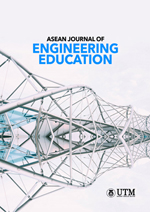Implementing Book-end Division Approach using ClassPoint to Energize Electrical and Electronics Engineering Student Engagement
DOI:
https://doi.org/10.11113/ajee2023.7n2.138Keywords:
ClassPoint, student engagement, classroom dynamics, learning environment, e-learningAbstract
TThis study investigates the efficacy of using ClassPoint in improving student engagement during class and its impact on academic performance among electrical and electronics engineering students by using student engagement framework that established by technology-enhanced learning (TEL) environment microsystem. To achieve this objective, five instructors teaching various courses incorporated ClassPoint into their classes. Then, quantitative data on student engagement and academic performance were collected via surveys. The student’s comments are extracted from university teaching evaluation survey (EPAT) for thematic analysis. The descriptive analysis revealed a significant increase in student engagement after ClassPoint was implemented. Furthermore, students appreciated the use of ClassPoint features such as slide-drawing, multiple choice questions, and word clouds during classes. Survey results also show students have greater attentiveness, active participation, and improved interactions with their peers and instructors. Likert scale responses indicate positive correlation between the use of ClassPoint and students’ enhanced performance in class discussions, idea integration, increased interest in learning, and improved classroom dynamics. Moreover, thematic analysis shows the empowering of five element in TEL microsystem with ClassPoint increase the student engagement. This study highlights ClassPoint's effectiveness in creating an inclusive and interactive learning environment, thus, transforming teaching methods for electrical and electronics engineering students.



















